GIGABYTE Z97X-UD5H Review: Choose Your Storage Option
by Ian Cutress on May 14, 2014 9:00 AM EST- Posted in
- Motherboards
- Intel
- Gigabyte
- Z97
Scientific and Synthetic Benchmarks
2D to 3D Rendering –Agisoft PhotoScan v1.0: link
Agisoft Photoscan creates 3D models from 2D images, a process which is very computationally expensive. The algorithm is split into four distinct phases, and different phases of the model reconstruction require either fast memory, fast IPC, more cores, or even OpenCL compute devices to hand. Agisoft supplied us with a special version of the software to script the process, where we take 50 images of a stately home and convert it into a medium quality model. This benchmark typically takes around 15-20 minutes on a high end PC on the CPU alone, with GPUs reducing the time.
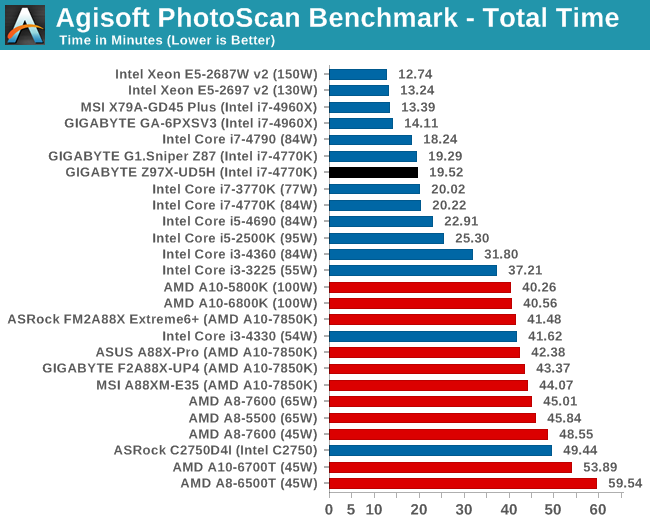
Console Emulation –Dolphin Benchmark: link
At the start of 2014 I was emailed with a link to a new emulation benchmark based on the Dolphin Emulator. The issue with emulators tends to be two-fold: game licensing and raw CPU power required for the emulation. As a result, many emulators are often bound by single thread CPU performance, and general reports tended to suggest that Haswell provided a significant post to emulator performance. This benchmark runs a Wii program that raytraces a complex 3D scene inside the Dolphin Wii emulator. Performance on this benchmark is a good proxy of the speed of Dolphin CPU emulation, which is an intensive single core task using most aspects of a CPU. Results are given in minutes, where the Wii itself scores 17.53; meaning that anything above this is faster than an actual Wii for processing Wii code, albeit emulated.
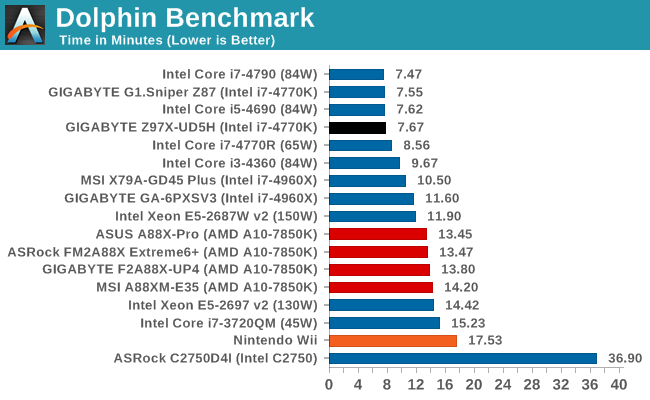
Point Calculations – 3D Movement Algorithm Test: link
3DPM is a self-penned benchmark, taking basic 3D movement algorithms used in Brownian Motion simulations and testing them for speed. High floating point performance, MHz and IPC wins in the single thread version, whereas the multithread version has to handle the threads and loves more cores.
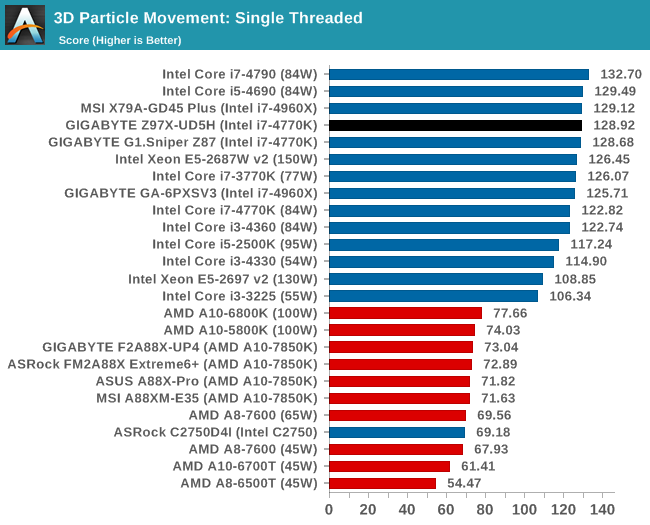
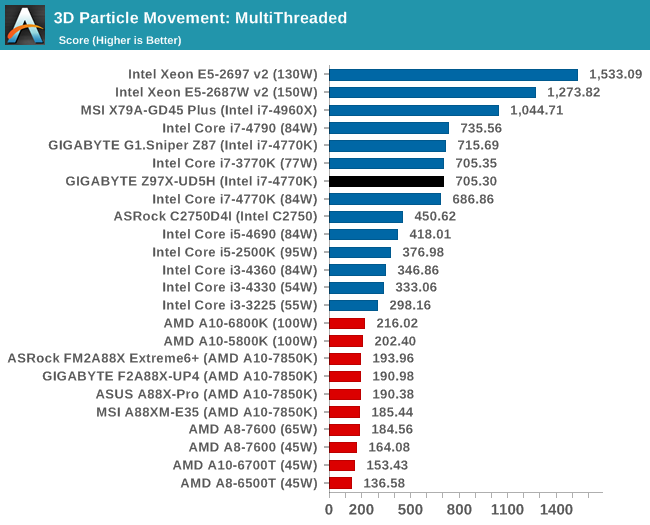
Encryption –TrueCrypt v0.7.1a: link
TrueCrypt is an off the shelf open source encryption tool for files and folders. For our test we run the benchmark mode using a 1GB buffer and take the mean result from AES encryption.
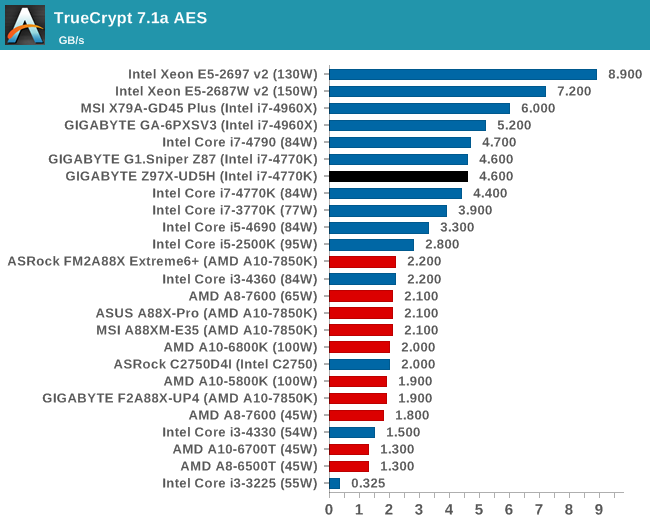
Synthetic – 7-Zip 9.2: link
As an open source compression tool, 7-Zip is a popular tool for making sets of files easier to handle and transfer. The software offers up its own benchmark, to which we report the result.
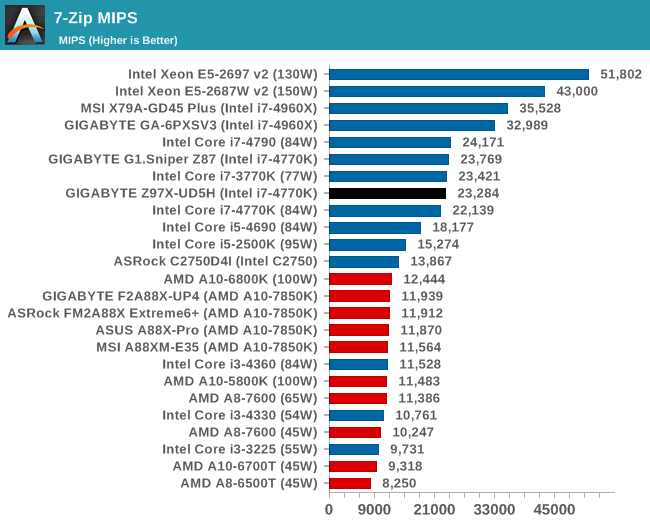










53 Comments
View All Comments
Marlowe - Wednesday, May 14, 2014 - link
Thank you. I wish there were M.2 benchmarks. Guess there are no drives out. Plextor M6e? Where are you and your friends?TelstarTOS - Thursday, May 15, 2014 - link
wrong, there are.basroil - Thursday, May 15, 2014 - link
M.2 PCIe drives worth testing don't yet exist, almost all are cheating (sata raid) or just not that great.TelstarTOS - Thursday, May 15, 2014 - link
There are two, the plextor is the lower performer, and ther Samsung XP941 that I linked above (but i'm not sure if the post was deleted - so i'm not posting a link here).TelstarTOS - Saturday, May 17, 2014 - link
Uhm it didn't take long for a review ;)XZerg - Wednesday, May 14, 2014 - link
hmmm... here i was hoping to see some storage benches but disappointment again. what's the point of calling the review "Choose Your Storage Option" when there is no storage review?kwrzesien - Wednesday, May 14, 2014 - link
Would it make sense to include the rear port cover in place for the picture? I'd like to see the finished effect, plus maybe it names which network port is Intel vs Killer.DanNeely - Wednesday, May 14, 2014 - link
Is the power consumption from the 900mhz underclocking option different from what's seen during the long idle test?DanNeely - Wednesday, May 14, 2014 - link
I really like that Gigabyte provided a block diagram of the board. Between flexible IO, PLX chips, on board USB hubs, and the sata switch used here; it can be really hard to figure out exactly what's connected where and what can be used at the same time. The diagram had almost everything I'd want to know collected in a single place; the only exception being which USB3 ports were attached to the hub.I really hope other motherboard vendors will provide similar information as well.
Ian Cutress - Wednesday, May 14, 2014 - link
GIGABYTE do this in all their motherboard manuals, so you only have to download the manual from the website and have a look. I am trying to get the other motherboard manufacturers to do this.